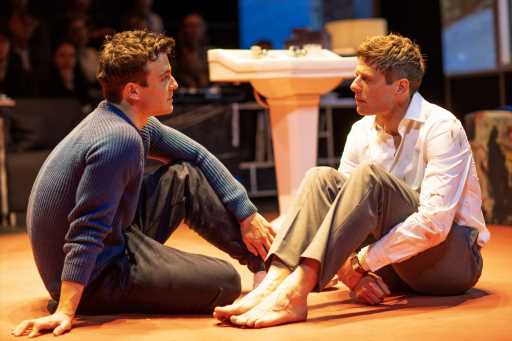
The alacrity with which the entire audience leapt to its collective feet the second that Ivo van Hove’s production of the trauma-filled “A Little Life” ended tells us two things. Firstly, that there is plenty to admire in the committed, heartfelt performances of the company of eight actors led by an emotionally unsparing James Norton. Secondly, that despite what should be deeply distressing content about life-wrecking child abuse and extreme self-harm with a less than joyous ending, no one was so upset that they were unable to move. Which is a problem.
“I kept putting the pages down,” says Harold in the play’s closing speech. Played with touching authority by Zubin Varla, he’s speaking of the pain-filled, eight-page, explanatory letter he has read, written by his adoptive son Jude, the play’s central character. That’s not a luxury afforded to the audience. They have endured Jude’s extreme pain being acted out unflinchingly across three hours and 40 minutes, the only break for air being the single intermission.
The absolute relentlessness of that doesn’t reflect the experience of reading Hanya Yanagihara’s million-selling novel since the latter runs, in the U.K. edition, to 814 pages — obviously impossible to read in a single sitting. That means that even the most committed reader gets respite from the litany of sequences of abuse, which so shockingly ruin Jude’s entire life.
Not here.
For better and worse, the adaptation by Koen Tachelet, Ivo van Hove and Yanagihara herself is extremely faithful to the novel which charts the longstanding friendship of, initially, four men who, on stage, we meet as 30-year-olds: painter JB, played by Omari Douglas (“It’s A Sin” ); architect Malcolm (Zach Wyatt); and actor Willem, played by Luke Thompson (“Bridgerton”), the last of whom shares an apartment with Norton’s Jude (“Happy Valley”, “Grantchester”).
For all the wit and care of the performances, Malcolm and JB register as one-note ciphers because the adaptation cuts them down to little more than plot functionaries. The impressive Thompson fares far better as his character ultimately develops a relationship that takes him far beyond merely being Jude’s affable, “heteronormative” roommate.
The focus is, in every sense, on versatile British screen favorite Norton, and not just because his presence – and his much-published nudity – has caused the limited run to sell out so fast that prior to opening, a transfer to a second West End house was announced.
As the handsome, bright, notoriously reticent, permanently single lawyer Jude who initially bats away all personal questions, Norton is utterly dedicated. In the opening scene, it’s immediately clear from the flimsy excuses he gives under attempted questioning that he is nursing dark secrets. It is the business of “A Little Life” for Jude, against his will, to flesh them out, to reveal the horror that makes him relentlessly self-harm. Gradually, the demons that so appallingly haunt him are made manifest by the portrayal of a succession of fiercely abusive men from his past, played with horribly convincing smoothness by Elliot Cowan who fully resists the obvious path of alerting the audience to his own hidden motives.
Theater would seem to be an ideal medium for a work centering on the absolute need for a victim of extreme abuse to begin to come to terms with the horror by not just confronting it but by speaking of it. That much is explained by Ana (Nathalie Armin), the only female character, who was his first and only therapist, but who died leaving Jude feeling yet more abandoned and betrayed by someone he trusted. At moments of utter extremity – there are many – he cries out for her and she appears as comfort.
The central role of a therapist is one of many reasons why, at its weakest, “A Little Life” feels like Peter Shaffer’s “Equus” minus the horses. Both use bald narration to set up scenes which are then acted out; move the story on via simplistic outer characters; work via a thriller-like slow tease-out of defining trauma; use vivid staging of terrifying pain with added therapeutic input. In other words, although both have theatrical high-points, they are only intermittently dramatic, not least because, slavishly obeying the novel’s structure rather than finding its own theatrical form, the underlying ideas here are more powerful than the writing of them.
Running half an hour shorter than Ivo van Hove’s original Dutch version that played BAM, there are no lines or speeches eloquent enough to portray the pain with sufficient depth. The actual dialogue strays toward the banal because, the efforts of the strong cast notwithstanding, it carries too little dramatic freight.
What rings truest is Norton’s honesty. His entirely open, increasingly blood-drenched performance brims with anguish, whether from enduring successive rapes and beatings, cutting himself or quietly struggling to allow others to reach in beneath his fiercely controlled exterior to attempt to cure his appalling self-loathing.
Seeking respite from his pain, he gently sings Mahler’s song “Ich bin der Welt abhanden gekommen” (I have been lost to the world). The lyric “I have died in the world” is made ominous, most of all via the final plot twist, which feels overly melodramatic and more than slightly manipulative.
Van Hove’s uncluttered, unfussy, utterly controlled production is, for wholly well-intentioned reasons, explicit about pain. Jude’s singing acts as a rare and deeply welcome moment of tenderness. But the action that surrounds it, underscored by a live string quartet playing Eric Sleichim’s doomy or neurotic score, is so insistent it lacks engaging light and shade. Despite a moment of undoubted shock and the winning of sympathy for Jude’s plight, ultimately the work on display feels more admirable than moving.
Read More About:
Source: Read Full Article